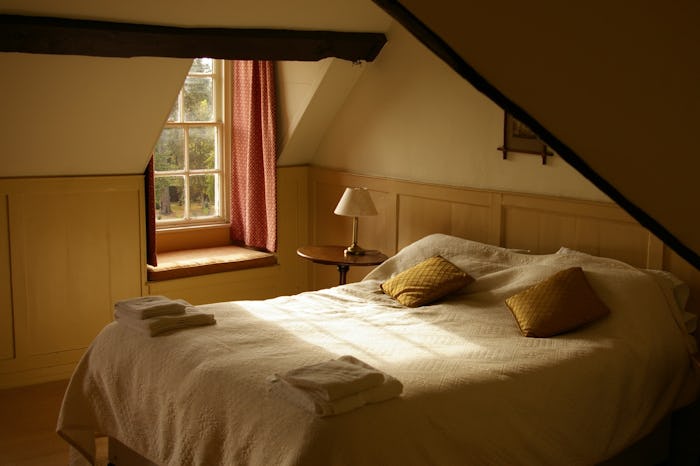Life

7 Ways To Turn Your Bedroom Into A Sleep Sanctuary
There are plenty of things you can blame for not getting a good night's sleep: that after dinner latte, staying up for a Netflix binge, or having one too many margaritas. But aside from all these potential sleep crushers, your bedroom may also be a culprit for your insomnia. But don't worry, all these things can be fixed — there are plenty of things to do to your bedroom for a better night’s sleep, you just need to be willing to make a few changes.
Even if you already have a pillowy mattress and sheets that are so soft it's like sleeping on a cloud, there are still ways to boost the optimum sleep potential of your boudoir. Everything from cutting out background noise to placing your bed in a certain corner of the room can make a difference in how you sleep at night. Unlike other rooms of the home, it's not what you add to the bedroom that makes it difference, it's what you take away from the space that will make it the best environment for relaxation and snoozing. Making small changes and being open to changing some bedtime habits (ah-hem, watching TV in bed) can make an enormous difference in the quality of sleep you experience each night.
If you've been dreaming of more sleep, don't lose hope before you try these seven things to do to your bedroom for a better night's sleep.
1Set The Perfect Temperature
When it comes to drifting off to dreamland, your thermostat may be your new best friend. According to the National Sleep Foundation, keeping a bedroom's temperature between 60 and 67 degrees is the sweet spot for a restful sleep. You may have to play around with a few temperatures within that range before you find exactly the number that works for you, but it'll be worth it for a night full of Zs.
2Use Aromatherapy
Even the scent in your bedroom can make a difference in how peacefully you sleep. If you've been tossing and turning, consider a suggestion from The Better Sleep Council and figure out which scents make you relaxed. Common calming aromas, like lavender, come in many forms such as candles, oils, lotions, and room sprays. Try adding a relaxing fragrance to your bedroom if you're looking to get some sleep.
3Remove Distractions
Your bedroom should be your cozy little sleep den, which means it should be as calming as the presence of the Dali Lama. OK, so that may be a little ambitious, but why not aim high? According to Health, electronics, clutter, and items that don't belong in a bedroom hinder your sleep. You goal is to keep the bedroom free from anything that will keep you from doing what you're meant to do: sleep.
4Keep It Quiet
One of the main offenders of sleep interruption is noise. Whether it comes from outside your bedroom, or if you tend to fall asleep with the TV on, sounds seep into your slumber and disrupt your rest. Good Housekeeping suggested using ambient noise to drown out background noise that can wake you up. Try an app — like White Noise Free Sleep Sounds — to maintain a constant soothing sound that blocks out the sounds you can't control.
5Feng Shui Your Bed
If you're having trouble getting a good night sleep, it could have to do with where your bed is placed. As HGTV explained, feng shui principals for sleeping have to do with furniture placement, specifically the bed. To allow the zen vibes to flow through the bedroom, your bed should be positioned as far from the bedroom door as possible. However, you should still be in a position to view the door when you are in bed. Placing your bed in the right area of your bedroom promotes good rest and chi flow.
6Keep It Dark
As Catherine Darley, a naturopathic sleep specialist at The Institute of Naturopathic Sleep Medicine in Seattle, Washington told Shape, when it comes to your bedroom, think of a "cave-like" level of light. This means don't use night lights, get black out curtains, and turn lit clocks away from you.
7Give It A Paint Makeover
According to Real Simple, the colors in your bedroom can effect the way you sleep. The shades and hues of your walls can make you feel different ways, and in a bedroom, you wants those colors to make you feel relaxed. When choosing a wall color, Real Simple suggests muted blue, moss green, pale yellow, and silver — all of which have been shown to produce a calming feeling.
Images: Paul L, Dean Houchman, hannahbananalangy, Christopher Smith, Nicola Jones, Blupics, Denise Cross Photography, torbakhopper/Flickr